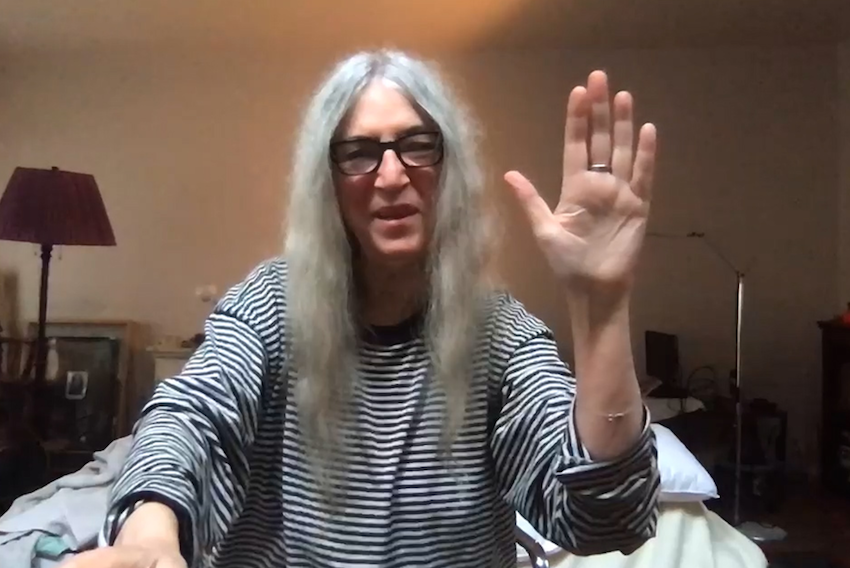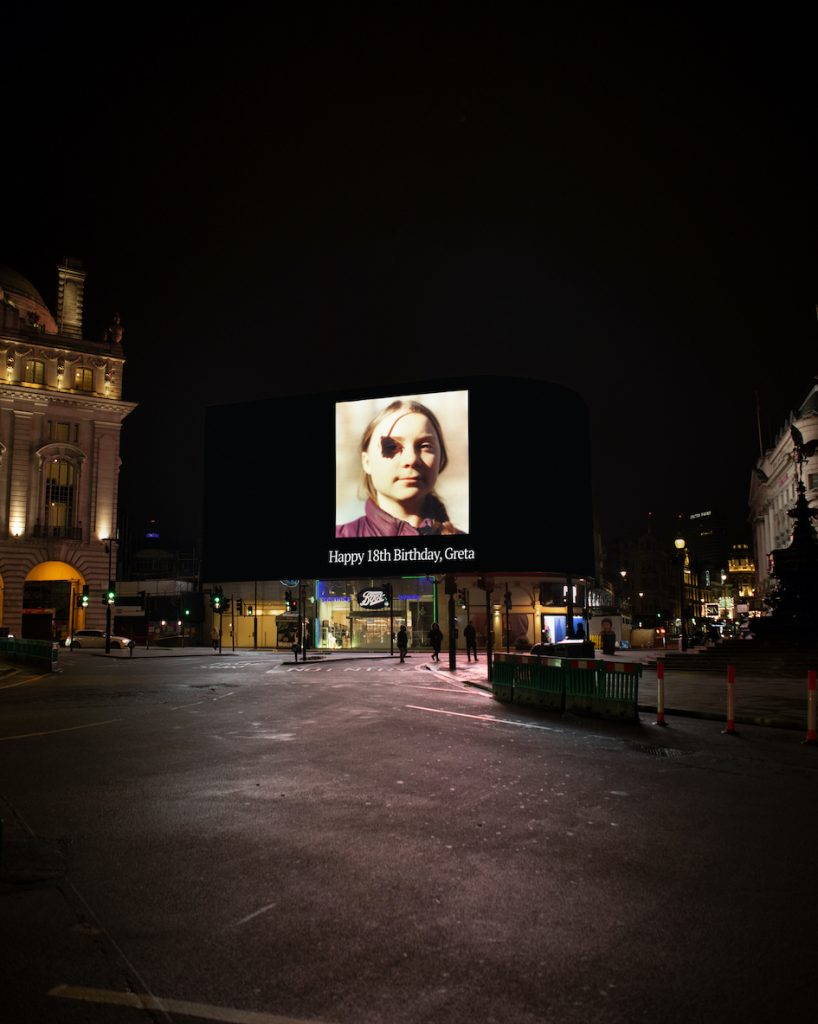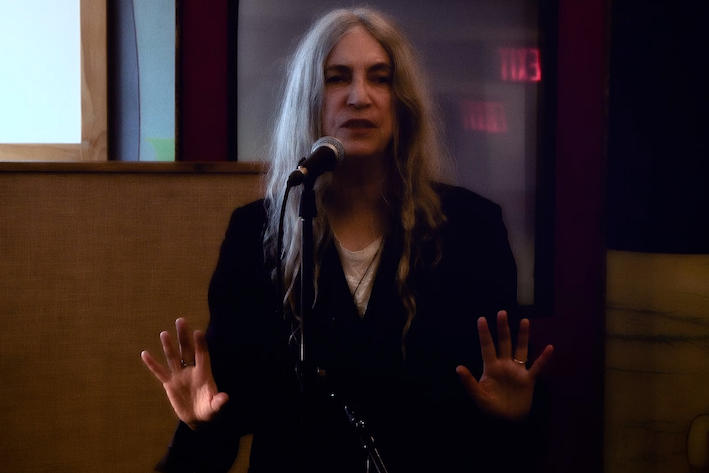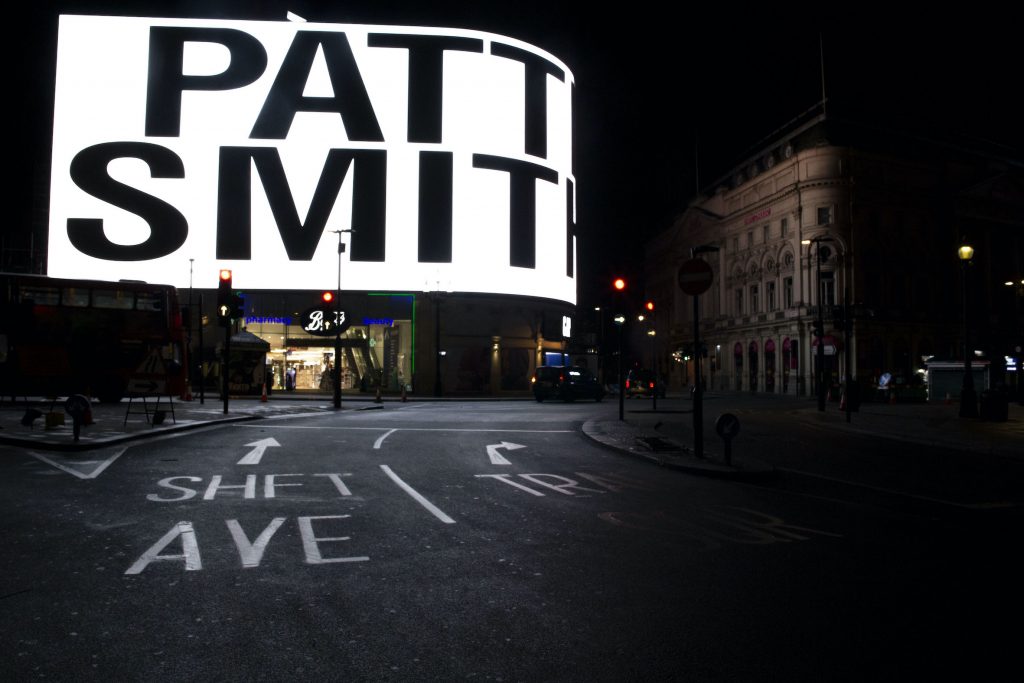Patti Smith: A New Year
Written by Charlie Colville

With the opening of the new year comes the announcement of better things and events to look forward to – including the extension of CIRCA for another twelve months! CIRCA 2021 is set to continue their mission to democratise art for the public on a global scale into the new year.
Created last year as a means of reconnecting the public with art and exhibitions during the pandemic, CIRCA allows for artists to showcase their work and ideas in the form of a two-minute video on the Piccadilly Lights, one of London’s most famous landmarks. Every month will see a different artist take to the screen, showcasing a two-minute video that expands on their practice and the messages they want to convey to the public.
To keep pace with the changing year, each video will be shown at 20:21GMT every night, breaking the usual stream of commercials and advertisements and creating a live exhibition experience. For those unable to make it to London, each video is streamed and archived on CIRCA’s website.
Breaking away from previous months’ content, CIRCA have dedicated January 2021 to poetry and the written word. Poetry hasn’t always been considered highly as an art form, and in recent decades has been criticised for being “boring” or “elitist”. By providing a space for poetry this month, CIRCA brings the spoken word further into the contemporary spotlight and expands the outlets for conversation available between artist and onlooker.
American singer-songwriter and punk rock legend Patti Smith leads the month with a selection of poetry both old and new, starting with a music performance to bring in the new year and set a hopeful tone for the rest of 2021. Although a pioneer of the 70s punk rock movement and an award-winning author, Smith will be using her collaboration with CIRCA to promote her work as a poet.
As mentioned, the CIRCA calendar this month features a mixture of content – from Smith’s poetry recitals and musical performances, to readings lists, and commissioned writing from up-and-coming poets from around the world.
The month started with a collaboration between Patti Smith and German visual artist Anne Imhof, as Imhof ended the final minutes of 2020 and Smith brought in the first moments of 2021 with her band.
The rest of January has been led by a recital of Smith’s new poem A New Year, which defines the artist’s outlook on the coming year with messages of hope and optimism. The public have had the opportunity to watch Smith’s recital nearly every night this month, with exceptions on specific days listed on the CIRCA calendar to commemorate anniversaries and events. For example, the 3rd and 20th of January saw recitals of other titles by Smith to celebrate specific events in 2021 – namely Greta Thunberg’s eighteenth birthday, and the inauguration of Joe Biden as President of the United States.
The CIRCA calendar will also feature other works released by Smith, from her more recent releases to some of her first published verses from 1972. Viewers are encouraged to explore the content on offer and get to know Smith’s work beyond her punk rock star image.
Some of the main themes that viewers will see this month are that of commemoration and celebration. 2021 marks the 50th anniversary of Smith’s first poetry recital at St. Mark’s Church-In-The-Bowery, New York, and so much of the content on show with CIRCA will similarly follow and expand upon moments in time which we can celebrate, commemorate, and memorialise – past, present, and future.

Smith’s collaboration with CIRCA defines itself through its ability to draw our attention to particular defining factors of our time, while reminding us of the possibility to cultivate a better future through social action.
January is a time associated with change and renewal – with the new year comes a new opportunity to better yourself, utilising your experiences from the previous year to tackle the challenges and goals you may have not been able to get round to before. Smith’s collaboration with CIRCA expresses this ‘shifting’ sensation by imbuing her words with excitement and confidence, while also reminding us of the issues that should be kept at the forefront of our minds as we move forward in 2021.
The collaboration between Anne Imhof and Patti Smith for CIRCA’s New Year’s Eve performance laid out these ideas perfectly. Imhof presented a newly commissioned work titled ONE, which was comprised of some previous work the artist had put together while working with Tate Modern back in 2019. A key point of focus in the artwork was a video of fellow artist Eliza Douglas whipping waves on the beaches of Normandy – an image which Imhof indicated was a reference to the recent Brexit transition.
The lone figure of Douglas, who looks pensively outwards across the English Channel, creates a striking image that resonates with the general unease many Brits feel when it comes to the future of our relations with the rest of Europe.
Douglas is primarily shown aggressively whipping the oncoming waves, but she is also seen quietly watching the scene before her with slumped shoulders. While the violent action of whipping may refer to the initial anger and build up of the Brexit campaign (or even the anger of the rest of Europe following the UK’s decision), it is Douglas’ tired and defeated appearance during her moments of stillness which stand out.
Her hunched posture as she pants and looks out at the water present an image of deflated weariness – something surely everyone in the UK can relate to in relation to Brexit’s endless stream of issues. With 2021 marking the final steps of Brexit, Imhof’s video only provides a reminder of the struggles that are yet to come.

In contrast, Smith opened the New Year with celebration and music, marking her residency with CIRCA as one that would seek to balance scary realities with boundless optimism. Alongside a performance of My Blakean Year, Smith paid tribute to the NHS and healthcare workers who had died from COVID-19 with a rendition of Peaceable Kingdom. An idea brought to life through a discussion between Smith and CIRCA’s creator, Josef O’Connor, the performance celebrated each individual’s memory and service while revisiting the hardships we have collectively faced in 2020. The lyrics of the song resonate with this message:
“But I guess we both knew We’d never be the same
Never be the same
Maybe one day we’ll be strong enough To build it back again
Build the peaceable kingdom Build it back again”
Smith’s performance conveyed that while times are tough and we can’t go back to living as we did before, we have the capacity to move forward and rebuild what we’ve lost. This message became even more pertinent after the news that Coronavirus cases were escalating and that we would be approaching a new national lockdown, which led CIRCA’s New Year’s Eve performances to move entirely online. These circumstances not only accentuated our awareness of the times we live in, but also showed us the tenacity we have to make the most of our situation.
As with CIRCA’s previous artists, Patti Smith’s submission for January was one she had to create while isolating at home.
The spread of Coronavirus has mean that Smith has had to adapt her practice and usual means of working – where before you could have seen her touring with her band or doing live poetry recitals, Smith now records her work remotely. Due to a bronchial condition, which she has suffered from her whole life, the poet has had to make sure to isolate herself in an effort to protect her health.
With this in mind, the video for A New Year is also a familiar one – resembling the various screens we come across on a Zoom call. Smith’s video immediately becomes relatable in this respect, making her message easier to digest. Knowing that we share similar experiences, in particular the isolation that comes with the feeling of time being put on hold, we can appreciate the changes Smith has made to her usual practice in order to continue delivering work. It becomes clear that learning new skills and using them to uphold means of communication are crucial to how we can continue to progress and maintain movement.
In an interview with Fiona Sturges for The Guardian, Smith went into detail on the process of making A New Year: “Some of the work I did in my bedroom, some in a recording studio and some at my desk… I had to teach myself how to use Photo Booth on my computer and film myself reading a poem. I’m sure there are 14-year-olds who can do this in five minutes, but it took me quite a while. But I got there and I’m so proud of myself.”
As the title suggests, the poem itself acts as a celebration of the transition into a new year, using imagery of renewal and rebirth to allow listeners to envisage a brighter future. The imagery on the last lines of the poem underlines this message of hope:
“And rainbows circled the earth like the rings of Saturn,
and all dipped their fingers into its formlessness and knew
that it was good.”
A reference to the Book of Genesis, ‘it was good’ alludes to the parallel of creating a new world for the beginning of mankind. In our case, Smith uses this to emphasise a new beginning – a future which can be created and upheld by our collaborative efforts. With this goal for prosperity marking the opening of 2021, Smith calls for us to look out at the world and examine what needs to be done to reach what we desire.
Building on this, the other poems released during Smith’s time with CIRCA examine specific social events and global issues that require our attention.
On the 3rd of January, Smith released The Cup, a poem dedicated to Greta Thunberg on her eighteenth birthday. Smith had similarly penned a poem last year for Thunberg, praising the young activist for her campaigns against climate change.
The Cup revisits this sentiment, but this time with a greater focus on our own interaction with the environment. Rather than press attention into what has been achieved, Smith uses her platform to emphasise what still needs to be done. Commanding a greater sense of urgency than A New Year, Smith upends the imagery of her previous poem to replace it with scenes of natural destruction:
“all of Nature nothing more
than an empty husk, the ghost
of an abandoned hive.”
Like A New Year, The Cup ends on a note of finality – although this one is much more jarring in its parting message. A new beginning is nowhere to be found, instead the only thing left are ‘ghosts’ of the past. Alluding to the hurried death of the planet, Smith makes it clear that the negligence society has shown to nature is the main cause. With some of these events now becoming more and more familiar to us – “the terrible crackling of the blazing rainforest”, “seas rising”, and “the Barrier Reef bleached as the bones of forgotten saints” – Smith drives home the need to assess our own impact on the natural world.
The Cup presents a break in the flow of the CIRCA calendar. Disrupting the messages of hope and progress that Smith puts forward with A New Year, the new poem grabs the audience’s attention with a warning on the speedy approach of climate disaster: this could be our future if we don’t take action.
Later dates in the CIRCA calendar – in particular the 20th of January – follow a similar objective in their goals to disrupt the stream of content. In doing so, it is emphasised that while it is important to reflect on our own growth, we must also be aware of the world around us and our contribution to its development.
As such, Smith continues to direct our attention beyond the realm of poetry and art practice, using her platform to keep the public grounded in the current moment. The future may be brighter, but the present is where work and collaboration are needed most.

Smith’s messages for work and progress are intertwined with many facets of society. As such, not only does the poet encourage greater assessments of the self and our impact on the world around us, she also directs our attention to the current political climate in relation to how we want to advance as a society.
With the political climate set to shift again in the US, many are celebrating this year as a step away from social setbacks and the controversial policies that defined the Trump presidency. Smith herself admits that she was relieved by the outcome of the 2020 Presidential Election, and looks forward to the opportunities this brings for the future:
“It’s been a terrible atmosphere to live in.
You try to do your work and not let [politics] permeate your consciousness daily but it does.
It’s very insidious… I’m a natural optimist so I’m not without hope or inspiration.
What matters is trying to clean up some of his mess and get some order.”
To mark the inauguration of Joe Biden as the next US president on the 20th of January, Smith presented a performance of People Have The Power, a song which was first released in 1988. The second musical presentation of the month, this performance sees Smith in the studio again with her band to commemorate an important event for the year.
Compared to the previous poems Smith has shared this month, People Have The Power has are greater overtones of criticism and unrest. Created as a protest song that could also quote the sounds and atmosphere of the 1960s, People Have The Power is an energetic declaration against unjust power systems. When placed in the context of the past year, where protest played such a large role in conveying the voice of the public, Smith’s poem becomes a powerful reflection of the areas of society that have campaigned for change.
“I awakened to the cry
That the people have the power
To redeem the work of fools.”
The song itself is a campaign for progression away from current or previous power structures, which in today’s case refer to the Trump administration. The ‘fools’ Smith calls out in her song, however allude to there being multiple people to blame for the state that society has been left in – not just the government, but also those who have become empowered by the more hateful and inflammatory attitudes of the people in power.
But Smith indicates that the tiresome and chaotic atmosphere that has been in place for so long is not undefeatable. Rather, it can be ‘redeemed’ by those who come together under a common goal.
“I believe everything we dream
Can come to pass through our union
We can turn the world around
We can turn the earth’s revolution.”
This is a message that becomes all the more prominent when combined with the visual element of Smith’s performance. People Have The Power is set against a montage of footage paying homage to people and organisations who have used their voice to help create a better future. These include Shirley Chisholm, Kamala Harris, Greta Thunberg, Naomi Wadler, The Soup Kitchen Holborn, and The Emergency Designer Network, to name a few. With these scenes acting as a backdrop, Smith’s performance becomes a celebration of potential – potential for what can be achieved by individuals and causes who use their voice.
As with her previous poems, Smith parts on the message that collective action is the best means for achieving prosperity and overturning preceding systems of social and political injustice. Dreams can become reality through teamwork, sparking results that can be greater than first imagined. The final line ‘turn the earth’s revolution’ highlights this sentiment: a dream leads to hope, hope leads to conviction, then communication, action, and finally success. Movement may seem an impossible action on your own, but together it can be accomplished.
The overall message Smith conveys is one which resonates with the general desire to move on from the previous administration in the US, while celebrating the possibility for a brighter future.
Where Eddie Peake had taught us last month how to look inwardly at the state of our lives and how our relationships had shifted within the context of contemporary society, Patti Smith directs our perspective outward to the world around us and the future we are running to meet.
Expanding on the principles of the CIRCA manifesto, Smith encourages the public to look at the world around them and use their learnings to progress towards their ideal definition of society. Using the experience of shifting time that comes with the new year, Smith urges us to learn from the previous year and utilise this to define our next steps positively.
CIRCA continues to enable artists to engage with the public and spread messages which incite action and positive outcomes, re-establishing the connections that would otherwise be lost in the isolation of the pandemic.
Charlie Colville is the current Arts Editor for Mouthing Off magazine, an online platform designed to give young people the opportunity to find a new voice – a guttural scream loud enough to arouse fresh ideas, creative thought, and inspire artistic flair.